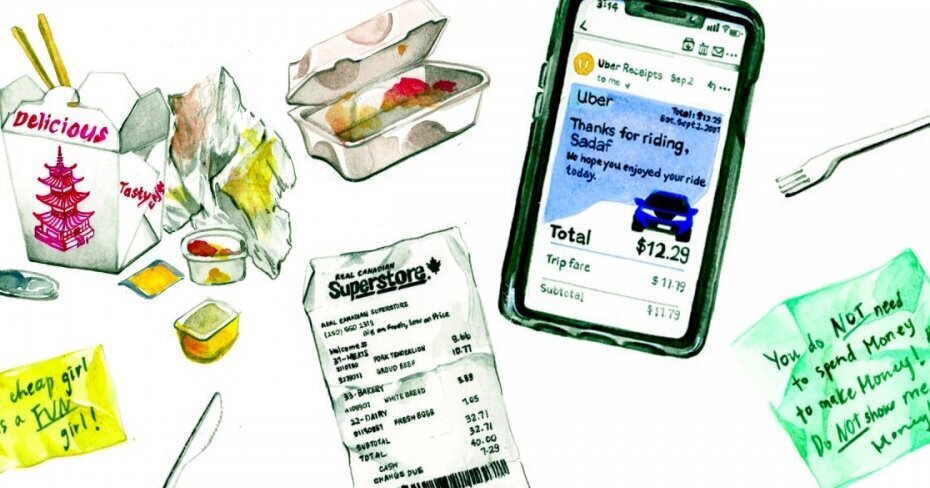Living at home until I was 28 saved me money, but cost me in other ways
By: Sadaf Ahsan on October 4, 2019
Money is a funny thing. It’s tangled up with just about every aspect of our lives — from where we live, to what we eat and the quality of our relationships — so it’s no wonder that all of us have opinions on what we should do with it. But what shaped our approach to money in the first place? What pivotal moment forever changed the way we think about our finances? To explore these questions, we’re introducing MONEY MOMENTS — a regular series where Canadians reflect on a moment in their lives that shaped their attitudes toward money.
***
On a winter evening last year, I cracked open my refrigerator door after a long day of work and found the following: two onions, two green peppers, three tomatoes, and packages of mushrooms, okra and Thai chilis. Under different circumstances, these vegetables could have been the ingredients for a delicious dinner. But each item was partially consumed, rotted and dripping with, well, I'm still not entirely sure what, but it was like the visual version of the Kill Bill siren: "Your food is expired again!" my refrigerator seemed to be yelling at me.
I closed the door with a burning shame, and turned to scan my kitchen. A stack of take-out boxes littered the counter and stuffed the trash can. It wasn't a pretty sight, but it had been a busy couple of weeks, packed with social engagements (and, therefore, a whole lot of doggy bags) and assignments that ate up my evenings.
Reckoning feels like a big word to use here, but if this wasn't that, I'm not sure what else it could have been.
Four months earlier, at the age of 28, I moved out of my parents’ home in Scarborough and into a one-bedroom apartment in midtown Toronto. Waiting until I was in my late 20s to move out might make me a late bloomer by North American standards, but living at home is par for the course when you're raised in a South Asian family, and moving out unmarried and just for some independence is considered, shall we say, uncouth. Plus, Toronto is an incredibly expensive city when you're in your 20s, living solo and making a writer's salary. On average, it runs young Torontonians nearly $3,400 a month to live here.
I had to learn from scratch what many other people my age already knew: how to support yourself financially
Although I had lived on my own once before while in school, this time the move was permanent — real. And as thrilling as this change was, I learned that winter evening that living on my own was proving to be even harder — and more costly — than I’d anticipated.
Being able to live at home for 28 years was an incredible privilege. Because my living expenses were minimal, I could afford to substantially pad my résumé for my current career in journalism: I completed 10 internships and earned a Master's degree while working a part-time job and saving. If I’d moved out earlier, there’s no way I would have been able to do any of this. Living at home certainly benefited my career growth, but in many ways, it stunted my personal financial growth. I had to learn from scratch what many other people my age already knew: how to support yourself financially.
Living on your own means no one to split rent, utilities or groceries with. While apartment hunting, this felt like no problem. So idealistic was I! See, I was used to being part of a big family unit, so in the first few months of living on my own, I would often overbuy at the grocery store. Even while cooking, I'd find myself making family-sized batches, because that's what I knew and the only way my brain seemed to read a recipe.
My bank statements read like a teenager who’d just moved out and gotten her first taste of freedom
Living with a family of five also meant I’d always had access to a communal batch of resources, whether that was food or toiletries. Suddenly, my singleness felt more glaring than ever. One does not enter a grocery store as a single person and feel welcome. There is no Loblaws or No Frills or Sobeys that isn't targeted specifically and entirely at families. Just about everything, from meat to rotis to a carton of milk, is meant for you and a plus one, or two, or three, or more. I would think I was buying reasonably, only to see my groceries expire before I could finish them.
I also indulged in takeout and Ubers to get me around the city. These were things I was doing to make the stress of working and taking care of myself just a little bit easier. But I was spending hundreds of dollars a month that I didn't have on things I didn't need, eating into my savings and not saving a dollar of what I was earning. My bank statements read like a teenager who’d just moved out and gotten her first taste of freedom — except I wasn’t a teenager and I knew better.
Of course, I eventually figured it out, thanks to inhaling any kind of relatable financial advice I could find and keeping a strict budget, complete with written affirmations (“You do NOT need to spend money to make money!”, “Do NOT show me the money!”, “A cheap girl is a fun girl!”, and so on). I also started freelancing and using an app to track my spending. Now, one year after moving out, I’m happy to report that I’ve got a handle on both my career and my finances.
While this experience has been challenging, it's also offered me so much growth in such a short time. It’s satisfying to know that I don’t need to rely on anyone else — especially my parents, who sacrificed so much to help give me the life I have now — and that whatever I do spend my money on, I can now truly afford.
Illustration by Janice Wu.


